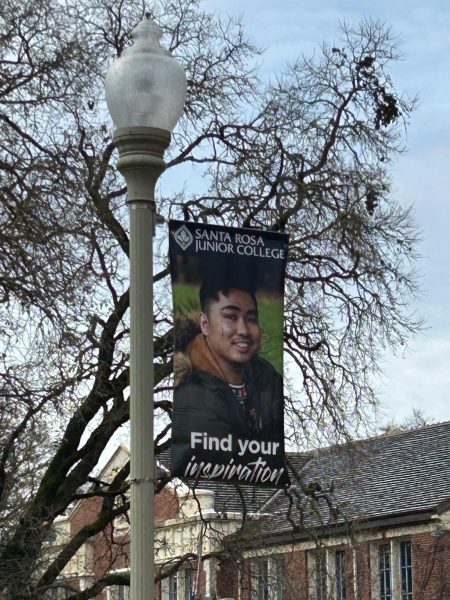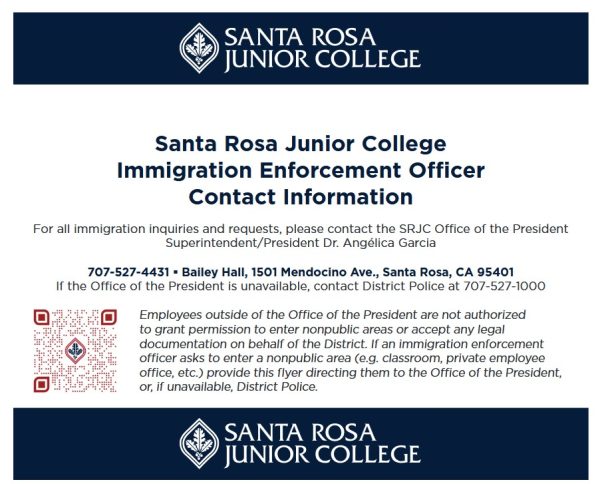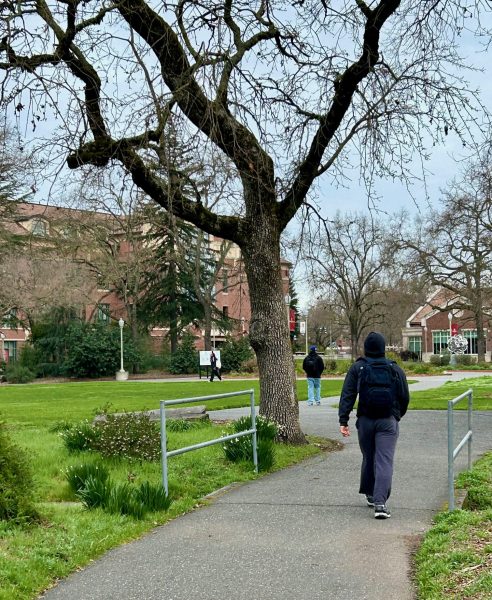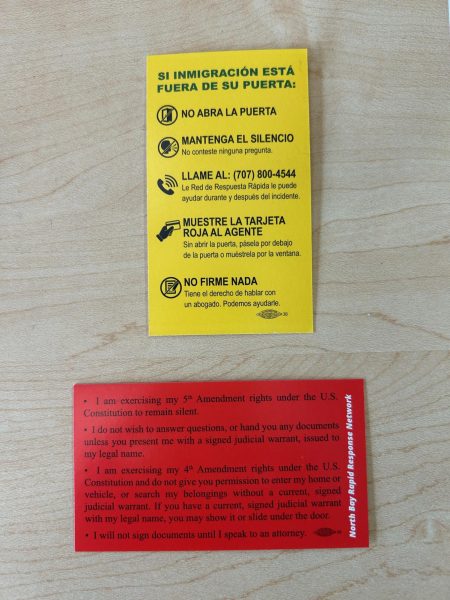Of the more than 100 executive orders Donald Trump has issued since Jan. 20, Executive Order 14165, Securing Our Borders, may be causing the most fear at Santa Rosa Junior College.
Calling for the arrest, detainment and deportation of unauthorized immigrants in the U.S., the order covers the approximately 11 million people whom the Department of Homeland Security categorizes as unauthorized immigrants. California alone has an estimated 100,000 undocumented students and students from mixed-status families — containing both U.S. citizens and undocumented individuals — with more than 45,000 in community college, according to CalMatters.
Immigrant families across the nation, including those of SRJC students, fear deportation for themselves or someone they love.
Rafael Vázquez Guzmán, SRJC humanities and religious studies professor, said building fear is the intention of the executive order. “It’s about creating fear so that people will self-deport,” he said.
Classes for newcomers
Bita Bookman, department chair of English for Multilingual Students (EMLS) at SRJC, is a native of Iran who grew up in Canada. In the two classes she’s teaching this semester, she said she notices “a lot of anxiety, lack of security, lack of motivation” among her students.
They come from many countries and language groups, she said. Most of her students this semester are from Latin America, others from Southeast Asia, Africa, the Middle East or Eastern Europe. Learning English is an important step for newcomers, and SRJC’s EMLS classes can help them pave the way to work and housing.
But students fear the new emphasis on stopping what Executive Order 14165 calls a “large-scale invasion” by “aliens.”
“One student asked me, ‘What is the point of studying when I have no future?’” Bookman said. “As an instructor, I don’t know what to answer.”

(Geneviève Duboscq)
Seeking legal status
A full-time SRJC student, whose family immigrated to the United States when she was 9 years old, said she lives “in constant, constant fear” of what might happen to her or her children, who were born in California.
Declining to use her real name, she said, “Call me Mary Smith, or whatever you like.”
Smith, who is in her 30s, has some protection through the Deferred Action for Childhood Arrivals (DACA) program. But the U.S. Citizenship and Immigration Services website specifies that “deferred action does not provide lawful status.”
Smith and her husband, who is U.S.-born and white, juggle work and school to raise and care for their children, both under age 6.
One parent works nights, the other days. Time together as a family is short.
“All I want is to take care of my family,” she said.
Smith has noticed a change in people’s willingness to say what they think — including hate speech — since the beginning of Trump’s second term. “Everyone feels free to do whatever they want. They just feel like they can say things. They are not as fearful of retaliation,” she said.
The Smiths have hired immigration lawyers to help her attain U.S. citizenship. “Our lawyers are saying, ‘Anything that is heavy police presence, anything that is a very hot-button topic in the Oval Office right now, just stay back. If you get scooped up, you will get questioned, and then that’s on your record.’”
Smith says air travel is problematic. Last year a flight to Southern California with her family turned into an ordeal. She carries her green card and passport as ID. “The minute the TSA agents say, ‘We have additional questions for you,’ they take you into a separate room” for 1 to 2 hours of questioning.
“They don’t let you make a phone call. My husband and kids didn’t know where the agents had taken me,” she recalled. “That room at SFO airport is very cold and very white.”
Smith prefers to drive within California to avoid scrutiny, though driving takes much longer.
Politically active in earlier years, Smith now keeps a low profile. “I want to be active and help the community feel supported,” she said, “but it is hard when I have to consider other lives.”
SRJC community support
In a February interview with The Oak Leaf, SRJC President Angélica Garcia said, “Students need to know that we will continue to do what we need to do to support them being able to feel safe here, to complete their courses.”
Garcia has also let staff and students know to send any inquiry from U.S. Immigration and Customs Enforcement (ICE) to her office in Bailey Hall.

(Geneviève Duboscq)
The college supports students directly through the Undocu Immigrant Dream Center, a resource center that helps with admissions, financial aid, academic counseling, legal and other resources.The college supports students directly through the Undocu Immigrant Dream Center, a resource center that helps with admissions, financial aid, academic counseling, legal and other resources.
One vocal SRJC advocate for immigrants, especially students, is humanities and religious studies professor Rafael Vázquez Guzmán, who came to the U.S. from Mexico as a refugee more than 30 years ago.
“The level of fear out there is very high,” he said in an interview. He has seen hate speech in graffiti on campus and repeated posts on the MySRJC app news feed that encouraged sending tips about undocumented immigrants to ICE.
“If I was undocumented, 18-year-old, 19-year-old, and I would see that,” Guzmán said, “I probably wouldn’t come back tomorrow, it almost says that the college is allowing for this type of behavior.”
Guzmán said he knows some SRJC students have not returned to campus this spring. Some are still in the area but staying away, and others have “self-deported.”
Admissions & Records specialist Ilda Lua provided the latest enrollment numbers, which show a decrease: 23,111 students enrolled in fall 2024 and 22,002 in spring 2025.
SRJC enrollment for the previous three years rose from fall to spring semesters. Academic year 2021-2022 saw an increase of more than 300 students in spring compared to fall, according to the SRJC Fact Book’s Student Headcount Comparisons. In 2022-2023, spring enrollment grew by more than 1100 students compared to fall. In 2023-2024, more than 200 students enrolled in spring than fall.
It’s unclear whether the drop in student enrollment from fall 2024 to spring 2025 is related to the Trump administration’s emphasis on securing the nation’s borders.
The state’s community college system “does not capture information on undocumented students,” wrote Kathy Lynch, interim general counsel from the California Community Colleges’ Office of the General Counsel, in Legal Advisory 24-11-15: “California and Its Community Colleges Remain Sanctuary Jurisdictions.”

(Geneviève Duboscq)
Two paths to choose from
A first-generation college student from an immigrant household, Bryan Fructuoso-Zurita, 24, is majoring in film/TV production and journalism at SRJC.
He sees a lot of fear in the community, mainly to do with the spread of misinformation on social media, he said. “‘Hey, ICE activity at XYZ location, don’t go outside!’”
Spreading misinformation can spread fear, causing people to avoid going to work or school, Fructuoso-Zurita said.
He is a member of Movimiento Estudiantil Chicana/o/x (M.E.Ch.A.) de SRJC, a student organization that promotes “cultural awareness, uplift and support” for the community, according to M.E.Ch.A’s website.
M.E.Ch.A. is distributing information to help immigrants deal with ICE raids. The red card available from the Immigrant Legal Resource Center in several languages tells people about their constitutional rights if stopped by ICE.
The yellow card from the North Bay Rapid Response Network provides a phone number — 707-800-4544 — for reporting an ICE sighting in Napa, Solano and Sonoma counties. Volunteers from the local organization check and verify the sightings.

(Geneviève Duboscq)
“We’re handing these cards out to the community so they know that they too as immigrants have rights in this country,” he said.
As a U.S.-born citizen, Fructuoso-Zurita said, “I want to use my privilege to help others that don’t have the same privilege, to let them know that they have rights. If I were to get in trouble, it would be lesser than if they do. I’d rather put myself at the front.”
Fructuoso-Zurita finds the current political climate challenging. “It has been stressful,” he said. “What if today I come home and I don’t see my parents? Or if I come to school and I don’t see my friend?”
Still he knows which path he’ll take: “I would much rather focus on being active and lending a hand rather than sitting in fear and not using my privilege to help others.”

